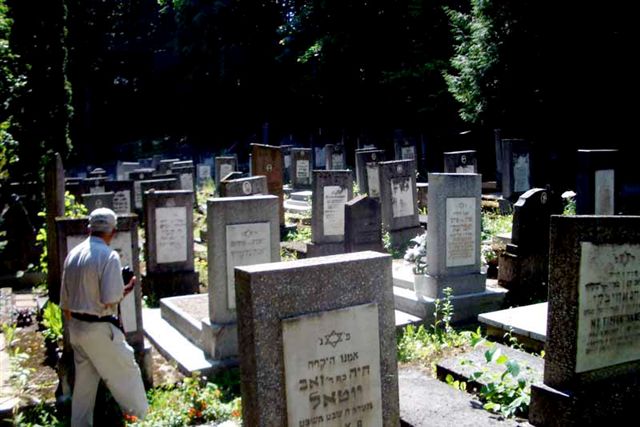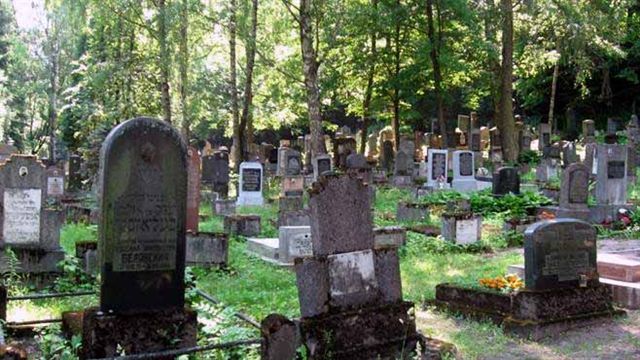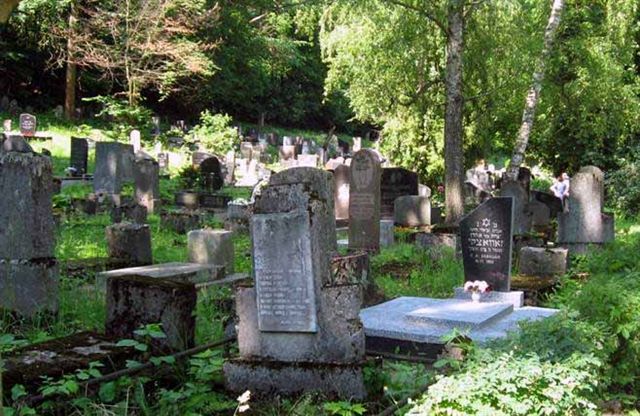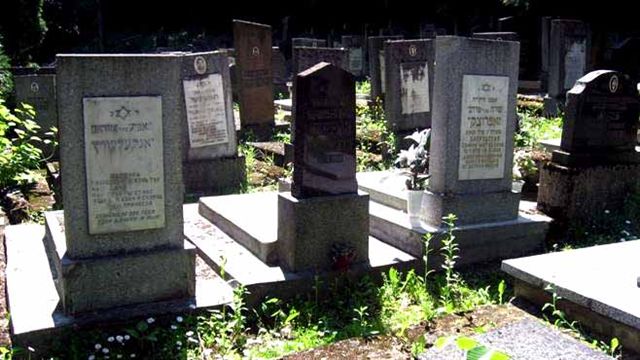Alternate names: Kaunas [Lith], Kovno, Ковно [Rus], Kovne, קאָװנע [Yid], Kovna [Heb], Kowno [Pol], Kauen [Ger]. 54°54' N, 23°54' E. Jewish population: 25,448 (in 1897), 40,000 (1914).
- Encyclopedia of Jewish Life (2001), pp. 604-609: "Kaunas"
- Pinkas HaKehilot, Lithuania (1996), p. 512: "Kaunas"
- Shtetl Finder (1989), p. 41: "Kovno".
- Surviving the Holocaust: The Kovno Ghetto diary
(, 1990) - Hidden History of the Kovno Ghetto
(Washington DC, 1997) -
(Moscow, 1948) - Kovno Ha'Yehudit Be'khurbana
(Jerusalem, 1959) - Haichel Sh'sheka; HaHinuch HaEvrei B'Kovna - Mosdot v'Ishim
(Tel Aviv, 1962) - Pinkasim fun Balbirishuk, Zidik, Yurbarik, Kovne, Vilne, Shnadau, Shkod, Mestislav Hadash, Pruzhani
(, ) - JOWBR: Viliampole Chevra Kadisha, 1941-1943
ShtetLink. [October 2001] Litvak SIG article. [November 2002]
Jewish history. [September 2010]
- VIDEO: Jurbarkas-Kaunas-Sauliai (Shavel)-Pokrojis-Birzai (226KB) - Online video of the cemeteries and synagogues of Jurbarkas, Kaunas and Pokrojis. Watch and listen to interviews with leaders of the Jewish communities in Kovno and Birzh. See views of the streets and meetings with other local Jewish people.[March 2009]
- VIDEO: Kaunas 9th forth-Saulenai-Sauliai-Joniskis-Taurage-Vainutas-Silute-Telsiai-Mazheiki-Leckava-Bauska (195KB) - Visit the archives in Kaunas, then terrible Nazi prison 9th fort. See the cemetery in Shavlyan, old synagogues in Shavel, Joniskis, Taurage. Jewish cemetery and famous Yeshiva in Telsiai, listen the interview with the leader of community in Yiddish. Leckava- the cemetery and the town. Bauska- views of the old town and the exhibition "Jews in Bauska" in local Museum. [March 2009]
BOOK: "Hidden History of the Kovno Ghetto, by Walter Reich" is an incredible book in its dimension of historical fact and documentation. The book begins in the summer 1941 - soon after German troops invaded Soviet territory and ends with the mass-murder of Jews and total incineration of the Kovno Ghetto.
- VIDEO: Film of Kaunas cemetery by Tomek Wisniewski: YouTube
- PHOTO GALLERIES: http://elirab.me/2014/05/22/kaunas-kovno-lithuania/
- http://elirab.me/2014/05/25/from-kaunas-to-klaipeda/
"Heytab Kadisha" burial society of Viliampole [Viliampoliai, Slabodke, Slobodka]: Burial list is held in the archives of the Beit Lochamai HaGetaot, the Ghetto Fighters Museum in Israel. The list is of those who died between 18 August 1941 and 31 December 1943. Yitzhak bar Moshe Devortsky produced the document. Members of the JewishGen and LitvakSIG and Dorothy Kohanski's senior group translated the names. Dr. Josef Ash, Rabbi Edward Cohen, Marc Dver, Prof. G.L. Esterson, Rodney Falk, Zvi Griliches, Ellen A. Jacobsm Harold Friedman, Yetta Gotsyn, Alex Malkin, Martha Lev-Zion, Avi Lishower, Jeffrey Maynard, Kevin Ossey, Harold Rhode, Robert Weiss, Jim Yarin, with co-ordinator This email address is being protected from spambots. You need JavaScript enabled to view it.. Kovno Cemetery lists of Jewish dead buried in Kovno cemetery for the years 1941-1943. Manuscript. Yiddish. 50 pages. Sent by Mr. Zvi Asherat, Israel. Mar. 22, 1982. Xerox copy. Vital Statistics file. American Jewish Archive, 3101 Clifton Ave. Cincinnati, Ohio 45220-2488; phone (513) 221-1875.
Three Jewish cemeteries can be visited in and around the city center:. The Old Jewish Cemetery to the north of Ąžuolynas is now a place for local drunk youths with graffiti filled walls and a selection of broken gravestones. The Old Jewish Cemetery in Vilijampolė was destroyed with most of its gravestones some time after WWII but if you walk to the far northern end of the field you'll find many old gravestones, some hundreds of years old, on the hill surrounded by a wood.
The Jewish community numbers about 600. Greenhill Cemetery is located in a residential area of Kaunas. This inactive cemetery is sadly neglected, but with outside help can be restored. Aleksot Jewish cemetery is an active use today, very well maintained and in excellent condition.There is a central cemetery office in Kaunas where the records for all cemeteries in Kaunas are kept. For the Jewish cemeteries, they only have records of Jews were buried since 1965. All other Jewish cemetery records are either missing or destroyed. The cemetery office is at KAPINIU PRIEZIUROS KONTORA, DONELAICIO G-VE 70, KAUNAS, LITHUANIA. Source: This email address is being protected from spambots. You need JavaScript enabled to view it. [August 2007]
Panemunes Cemetery: (Aukštosios Panemunės). 178 Viadoto Gotve Str. t. Established 1710, the site currently is protected as a Jewish cemetery. Located between Vaidotas Street and the Nemunas River. An entrance sign in Lithuanian reads "SENOSIOS ŽYDU KAPIN0S TEBUNIE ŠVENTAS MIRUSIUJU ATMINIMAS" with a Star of David. GThe gravestones are buried so deep into the ground that the inscriptions cannot be read. Only 3 gravestones are visible. The cemetery is owned by the local municipality. information. [September 2010]
"The original Kovno Jewish cemetery was inactivated and pretty much destroyed in the early 1970s, presumably to make way for a highway or some such project that was apparently never built. Friends of mine who visited the site last summer said it was in horrible disarray, not kept up at all for years. Families still in Lithuania or the Soviet Union at the time were given the option of moving their relatives' graves to what is now the active Jewish cemetery, south of the Niemen (Nemunas) River, near Panemune, I think. I had an uncle in the Soviet Union at the time, so I knew about this ... This cemetery is relatively well kept, and still in use. Unfortunately, there is no signage at the entrance nor are there signs directing drivers to the cemetery's location. People in the area, however, were kind and helpful when we asked for directions." Source: JewishGen Digest, 12 Sept 2004. [September 2004]
Vilijampoles (Kauno Vilijampolės) Cemetery: information. [September 2010]
Vilijampoles Cemetery (Kalnų Street): Information. [September 2010]
Aleksotas Cemetery: Kaunas' only remaining active Jewish Cemetery in Aleksotas can be accessed through a gate at the back of the Naleksta factory on H ir O Minkovskių.
CEMETERY: This very large, still-active cemetery is very well maintained and contains several thousand stones. Some are in very good condition, mostly newer stones. Some stones have been moved from other cemeteries. Kaunas (Kovno) cemetery is huge. Jewish community has only legally been able to maintain it since 1991. Between WWII and 1991 for construction, locals carried off many hundreds of stones. Many brick tombs were dismantled. Thousands of stones remain in an area that covers perhaps 20-30 acres. As of 1993, the city was negotiating with the Jewish community. The city wanted to demolish a portion of the cemetery, alleging the site was overgrown and beyond the capacity of the Jewish community to maintain. The community supposedly does possess cemetery records, although I did not see them. The cemetery is overwhelming. Overrun with vegetation and in a state of dilapidation, thousands of fine stones still standing. Source: This email address is being protected from spambots. You need JavaScript enabled to view it. [date?]
The Jewish cemetery in Kaunas, the second largest city in Lithuania, is accessed through an area that formerly housed Soviet army units and now serves the same purpose for the Lithuanian army. The cemetery is adjacent to this area of army barracks, across a single railroad track, and physically separated by a fence. The gravestones and markers are generally in good condition and readable, with names in both Yiddish and Lithuanian. The newer stones often have photos of the deceased or the likeness carved in the stone. There has been some minor vandalism, but relatively little defacement or damage to the markers. Only one stone was observed that had sustained significant damage at the hands of vandals. This stone, which has been rather crudely repaired, belonged to one of my relatives. At one end of the cemetery is a memorial to those who died in the Kaunas (Kovno) Ghetto during WW II. Nearby is the grave of a prominent rabbi, nearly a century old, and that of his son. The small Jewish population of Kaunas, numbering now about 300, still remembers this historic religious figure as evidenced by the stones placed on the grave and a still-burning Yahrzeit candle during my visit. Source: This email address is being protected from spambots. You need JavaScript enabled to view it. [date?]
UPDATE: No need to go through army barracks or over train tracks. There is a large open gate on Radvilenu St. The ohel on the grave of Rabbi Yitchak Elchonon Spector and his son has been demolished by vandalism. I could not find traces of the gravestone either. I gather quite a lot of vandalism has gone on in the past couple of years. This email address is being protected from spambots. You need JavaScript enabled to view it., Jerusalem, Israel. [August 2003] UPDATE: "Mr. Fuss's information is inaccurate. Access to the cemetery: you must still go in through the barracks/industrial site and cross a track. Rabbi Yitchack Elchanan Spector and Rabbi Tvi Rabinovitz are both in perfect condition in an ohel at the end of the cemetery." This email address is being protected from spambots. You need JavaScript enabled to view it.: [May 2005]
cemetery photos. photos. [September 2010]
HOLOCAUST and MASS GRAVES: Story of Kovno Ghetto with photos. Links to multiple stories about the ghetto. Fort #9 is one of many old forts surrounding Kaunas. The Nazis converted them into killing grounds. Sgns and stones tell how many thousands are buried in each mass grave. The Lithuanian government is looking after all these places and taking good care of the sites. At Fort #9 a museum and a huge memorial commemorating the dead. [March 2009]
MACEVA is a non-profit Jewish led organization in Lithuania dedicated to restoring Jewish cemeteries there. MACEVA, has achieved a monumental accomplishment. With urging from MACEVA, the city of Kaunas has agreed to help in the restoration of the old Kaunas Zaliakalnis Jewish cemetery - 80,000 sq. meters of desecrated grave stones. Litvak SIG, the Kaunas Jewish community, and Maceva will monitor the work. I have visited that cemetery and most of the gravestones are made of granite instead of marble or sandstone. Consequently, many of the gravestones are very legible. The problem is, many stones have toppled over, or are broken into several pieces. Vegetation growth is also a major problem. After restoration, photos will be taken of the gravestones and will be made available. The data that results from MACEVA's work will appear in the LitvakSIG All Lithuania Database. The major need now is for contributions so the restoration and photos can be accomplished. Go to www.litvaksig.org/contribute and make your contribution. Any amount will be appreciated. Scroll down to SPECIAL PROJECT. Leave the PROJECT blank. In the NOTE Block, key in MACEVA. Feel free to use your credit card as the site is secure. This is not to be confused with the new Jewish cemetery in Kaunas. which is in excellent condition and very well maintained. For information about the graves in that cemetery, please contact the Kaunas Cemetery Office, where they keep cemetery records from all the cemeteries in Kaunas. For the Jewish records they only have records for the Jews who died in Kaunas in 1965 and later. All other Jewish cemetery records are either missing or destroyed. The Jewish records they have, are recorded in 2 books, one line per person Cemetery Office is: KAPINIU PRIEZIUROS KONTORA DONELAICIO G-VE 70 KAUNAS, Lithuania Source: Howard Margol, This email address is being protected from spambots. You need JavaScript enabled to view it. via JewishGen Digests [June 2012]
Photos courtesy This email address is being protected from spambots. You need JavaScript enabled to view it.
[UPDATE]: Lithuania: Report on 2015 activities of MACEVA Jewish cemetery organization [June 2016]
[UPDATE] Cemetery work in Kaunas [August 2017]




